Young M.A has become the New York champion of hard-nosed freestyles about being a woman
Talking to Katorah Marrero, it's easy to see why M.I.A. has booked her for Meltdown this month
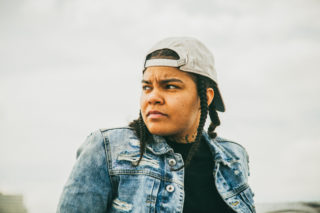
Talking to Katorah Marrero, it's easy to see why M.I.A. has booked her for Meltdown this month
Young M.A doesn’t care for your bullshit. On ‘Same Set’, from her new EP, ‘Herstory’, that bullshit is rappers who pose in foreign cars: “In the Yams with some Jordans, on our scooter bikes / They was claiming that they do it but don’t do it right / It’s not about what you got, it’s about who you are / ‘Cause we don’t need foreign cars to get foreign broads.” As the beat rides out, she cackles about it with her team: ‘But nah for real, we really be in the Yams on them scooter bikes bro. We got the Jordans on the back of them and all that. Then we see these niggas comin’ down the strip in foreign cars. And we be laughin’, ‘cause when you look inside of them, it’s just niggas. No girls – niggas… We them niggas.’ It’s classic New York rap paired with familiar no-nonsense punch line, the type you can imagine Chris Rock delivering to a crowd of hundreds. But on the track, M.A (born Katorah Marrero) is just chilling with her friends rather than delivering a sermon; her performance is assertive, but casual enough to feel more like passing thoughts than a showy performance, where we’re welcomed into that personal space to enjoy her company.
Being genuine through her music is a focal point of our conversation. “It’s just real. It’s realistic. There’s no bluffing. There’s nothing fake about it,” she says. Fittingly, though talking through the impersonal filter of an international conference call, Young M.A is giving all sides of herself, stunningly open in a way some people would be hesitant to do with long-time friends, let alone strangers – and white boy suburban strangers at that.
She’s keen to reiterate, deliberating over every word so it’s felt over the phone: “I speak my mind. I’m blunt. I’m straight to the point, and I really don’t care what people think. It’s just something that a lot of people can relate to… a lot of people will come up to me and tell me that I inspire them, because I’m so bold about myself.” You can see why M.I.A. has asked her to perform as part of her Meltdown Festival at London’s Southbank Centre this month.
This boldness is front-and-centre within most rap, but that doesn’t make how Young M.A does it any less vital. She’s a self-made artist and businesswoman who rose through sheer talent and willpower, using hard-nosed freestyles rather than buzzy features, all while refusing to censor herself. Her music often speaks of this self-belief, as well as a trust in her family, her faith and her identity as a young, black, gay American. One of her favourite topics is women – her ‘Sex Issue’ freestyle for the Fader turned heads for its blatant references to a wild night with a girl, and a nine-inch helping hand – brash to some, significant to many other fans, who are her lifeblood.
“Sometimes it’s still surreal to me to see somebody crying over me,” she says. “Like, to me, I still feel like I’m just me!… But they don’t look at me like that. It’s deeper. It’s bigger than that. And I’m starting to understand that.
“That’s my motivation, man. They keep me in high spirits. This world can definitely be real cruel, very disrespectful, but these people… it just makes me feel like ‘you’re here for a reason, you’re doing this for a reason, and this is what God had planned for you. This is why you’ve loved music for so long.’”
As a unique figure in the current hip-hop landscape, Young M.A has her fair share of detractors. The comments underneath her biggest freestyles are quickly poisoned by slurs and homophobia, though this isn’t something that fazes her.
“Come on, man. I’m not trash,” she smirks. “A lot of people [know that] M.A is one of the hottest artists, so when I see people say that, I know what it really is. I know that they really don’t like me as me. I can respect that more because I know that it’s not about my music, it’s just that you don’t like me as a human being.
“Nobody’s never, ever came to me, face to face, and said anything disrespectful to me… People sit here crying in front of me, so I could never let a little comment on the Internet make me feel like I’m not doing what I’m supposed to do.”
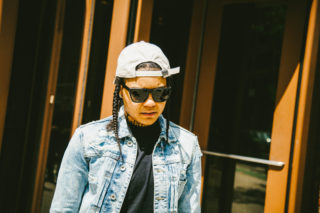
Though just twenty-four, Young M.A has had this steadfast vision for some years. She started rapping at the age of nine; her early early verses signal the same confidence, even before she refined her technique. The cover of her new EP is a candid shot of a fourteen-year-old M.A counting dollars, taken by her uncle, and that unfiltered tone is carried forward to now.
Even when she writes a radio smash, she does it her way. Her breakout hit, ‘OOOUUU’, has no chorus, no hook. Just a vibe and a collection of giddy observations. (Despite her confidence, she’s open to admitting her shock at the legs it grew: “I knew it was gonna be big, but I didn’t know it was gonna be this big …”). If she’s going for a woozy party atmosphere, you can bet she’s partying at the time: ‘I ain’t gonna lie. I’m a little smizzzzzzzz. I’m a little drizzzzzzz,’ she confesses at the beginning of the song, her words soaked in Hennessey and charisma.
For her, the atmosphere surrounding a recording is just as intertwined in the creative process as the writing. “I do have beats where I hear and I automatically lock it in, like when I did the ‘Hot Sauce’ record,” she says. “I sat on that beat for, like, a year before I even wrote something to it.
“There’s not always a time where you hear a beat and you wanna write to it right away. You don’t even know what the hell to say on it, but you know there’s something about that beat that’s gonna be make you put something very creative to it. And then I’ve had those times where I’ll hear a beat right then and there and I’ll be like ‘oh no I’ve gotta write for this right now’. You’ve gotta be there in that moment.
“Writing is not easy, man. People think, y’know, that when you know how to rap, for that person, that writing is easy for them, and it’s not. It’s very difficult when you’re not in that mood or in that format… You find yourself repeating yourself sometimes.”
M.A is just back from her supporting stint with 21 Savage, the biggest set of stadium dates she’s done yet. Progress is on her mind afterwards.
“It was one of the best experiences I’ve ever had,” she tells me. “I was able to bring my whole team with me – we learnt a lot; we grew a lot.”
Main stage touring is still relatively new to her. When she got the call from Beyoncé’s team to open for her in NYC she had only played clubs. And despite her conviction, this isn’t something that comes naturally.
“My mom used to try to make me perform at, like, family reunions and stuff like that, but I was shy. That was the only thing that I was shy about – performing in front of people. Anything else – I used to play football, I used to do all these things… basketball was no problem, but performing in front of people was really my issue.
“When I got older, and really got serious with the music, I noticed that when you get on stage, you had to almost not really look at the crowd, like you were looking around… You know these people came to see you. And if they came to watch you then obviously, they love who you are, and they’re gonna listen… I wanna give these people a show, so they aren’t gonna ever forget me…” She pauses. “And I wanna really talk to them.
“It’s almost like therapy,” she says. “You’ve been holding so much in that when you get on that stage, you just release it. That’s how I learned to look at it, and that’s what helped me. You’re releasing all that frustration, and whatever you have built up, you’re giving it all to the crowd, and they’re just enjoying every moment of it. And it feels good when you’re done, and you can drink a bottle of water.” She laughs.
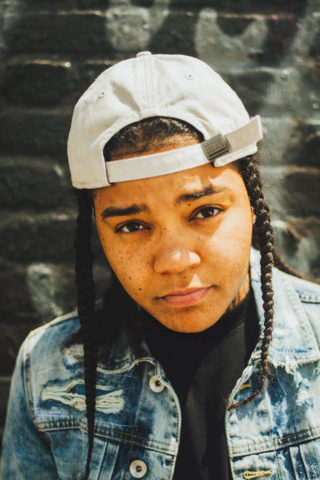
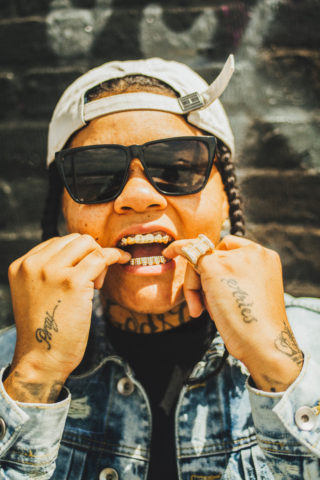
Young M.A’s unsureness, in her stage presence or in her writing process, is a side that has only peeked through so far, musically. Her new EP gives us pieces of her, but the thrill lies in what she chooses to give and what she chooses to leave out. ‘Bonnie’ touches on the gooey honeymoon period of a relationship; references to her family, her past and her surroundings are laced throughout, but buoyant summer energy is the overwhelming feeling. Something deeper lurks under the surface. “That’s really what I focused on,” she says. “Giving summertime music, but still making it about me at the same time. When the album comes the album’s gonna be a little more personal, a little more involved with who Young M.A is.
“There’s so much I have to say, and I’ve got to say, that’s gonna inspire people so much more. I can’t wait to give them a body of work, a storyline. It’s almost gonna be a documentary on an LP… There’s a story that a lot of people aren’t familiar with on my end… Even though I’ve dealt with struggles like every other type of person, I also have other issues that I deal with just by what I represent. I want to express that to people.
“I’d rather them see the real me than the radio and the ‘OOOUUU’, y’know. That’s the fun part, that’s the clubbing. But I really want people to understand that it’s deeper than that. There’s so much more to me than that.”
So why release the EP in the first place? M.A freely admits it’s marketing, and a will to survive as an independent figure. Though this has been a learning process.
“I can never sit here and say I’ve got it all together. It’s difficult. When you’re independent… you make more of the decisions. When you came from not knowing nothing about the business to ‘now you’re in the business’ and now you’re dealing with everything all at once. I’m really grateful that I do have a team that I can rely on.
“I’m still not where I wanna be,” she says. “Yeah, there’s a lot of people that know me, but there’s still a lot of people that don’t. I feel like that’s just giving me more work to do.”
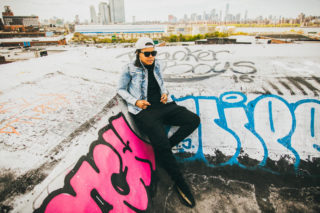
It’s clear that being ‘real’ to M.A differs from what a lot of artists would call being real. To her, being real is being human. It’s messy, multifaceted, rich and rewarding, just like her music. Though that doesn’t mean she won’t change herself to get where she believes she’s meant to be.
Her brother died as a result of gang violence, and it’s clear that the weight of this affected her art. She tells me: “When I used to make songs and freestyles a couple of years ago, I was a little more on the violent side of things, just talking a little too aggressively, and I had to really grow up and tell myself ‘let’s calm it down a little bit, let’s minimise that a little bit’… and let’s focus on music that’s gonna sell, and that’s gonna get you to radio and where you need to be.”
In 2014, a viral video for her song ‘Brooklyn Chiraq’ generated negative attention for its arguable glorification of violence. The vivid ownership of her experiences hasn’t been dampened as she’s decided to make her music more positive and palatable. “My life has changed too, so a lot of those things that used to happen don’t happen now, and I don’t need to speak about it as much… but when it comes to WOMEN, and stuff like that, I really don’t care. I’ll say whatever I think…” She trails off, laughing.